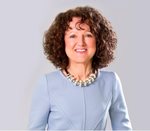
Alison McGregor
Chair designate, The Malcolm Group Ltd; NED at Fidelity Special Values plc; NED and Audit
Committee member at Scottish Power Energy Network Holdings; trustee at Beatson Cancer charity and more.
You can listen to Alison’s story in full on podcast here or search ‘Women on Boards Success Stories’ in all major apps:
The power of a strong network
We often hear that networking is important when it comes to building a board career. Just what a difference a broad network makes is highly evident in how Alison McGregor built her impressive portfolio.
Clearly, having ‘CEO of HSBC Scotland’ on your CV helps when looking for a NED role. That kind of top leadership experience brings a huge amount of skills which all boards need. Yet, Alison was warned she would struggle to build a cross-sector portfolio having spent her career in banking.
Given Alison now has board roles with an energy infrastructure company, a construction firm, an investment trust and more, it’s fair to say she has proved that advice wrong. But how did Alison move beyond financial services as a non-executive? “One reason .. is the spread of what I’ve done,” reflects Alison. Whilst in her CEO role, Alison also held board roles at Scottish Enterprise and chaired the Scottish CBI. This opened up networks far beyond the banking sector.
“It was an extremely busy period in my life,” she admits, talking frankly about the trade-offs of taking non-executive opportunities alongside a senior executive role. Looking back, it was also a catalyst to become more strategic with her time. She narrowed down her speaking opportunities to those which reached a wider audience. She reduced her individual meetings to help other women’s progression and brought Women on Boards in as a Corporate Partner to HSBC Scotland to support women, and men, at different career stages.
Developing a portfolio
Alison’s hard work at this time proved crucial to her move into a portfolio career. These board positions were key to building Alison’s non-executive contacts, but Alison took a planned approach to this. She began approaching CEOs and Chairs for advice on becoming a NED around 18months before leaving HSBC, being discreet about her planned timing. She says the men in particular were extremely helpful in not only sharing tips, but in introducing her to others. Alison’s role took her to London frequently, where she aimed to meet one new person each trip – building a large, broad network in the non-executive space.
Alison’s roles at Fidelity Special Values plc and Scottish Power Energy Network Holdings both came from contacts made around that time. In fact, Scottish Power was the first role she took on after leaving HSBC. “This was a brave one for me, going into an energy company rather than a bank,” Alison says. Although she’s found a huge amount of learning, she’s also found her knowledge of risk, audit, regulators and more is highly relevant – just as the Chair knew it would be.
However, Alison’s long-standing contacts have also brought opportunities. She is soon-to-be Chair of Malcolm Group Ltd, a logistics and construction company she worked with much earlier in her career as their bank’s relationship manager. Despite moving on in her role, Alison kept in touch with the CEO to offer informal advice and generally ‘chew the fat’. When she moved to portfolio, the group asked her to join their board as a future Chair.
The importance of the Chair
In retrospect, Alison would have joined a board earlier in her career. She advises others to look at board roles early, and seek out those with a good Chair to learn from. The Chair is still one of Alison’s top factors in deciding to take a role.
She also considers a strong Board CV to be very important in positioning yourself. “I got fantastic support from Women on Boards on this,” says Alison. “I always felt proud to send over my CV – which is very different to my banking CV.”
Like many others, Alison has found the practicalities of managing a portfolio a challenge. However, she has been careful not to over-commit herself and has retain some flexibility to take opportunities when they come up. “I’d consider something in banking,” she muses, “it would be a shame to have spent my career there and not contribute as a non-executive.” Quite the opposite to that early advice warning she would be limited as a banker.
